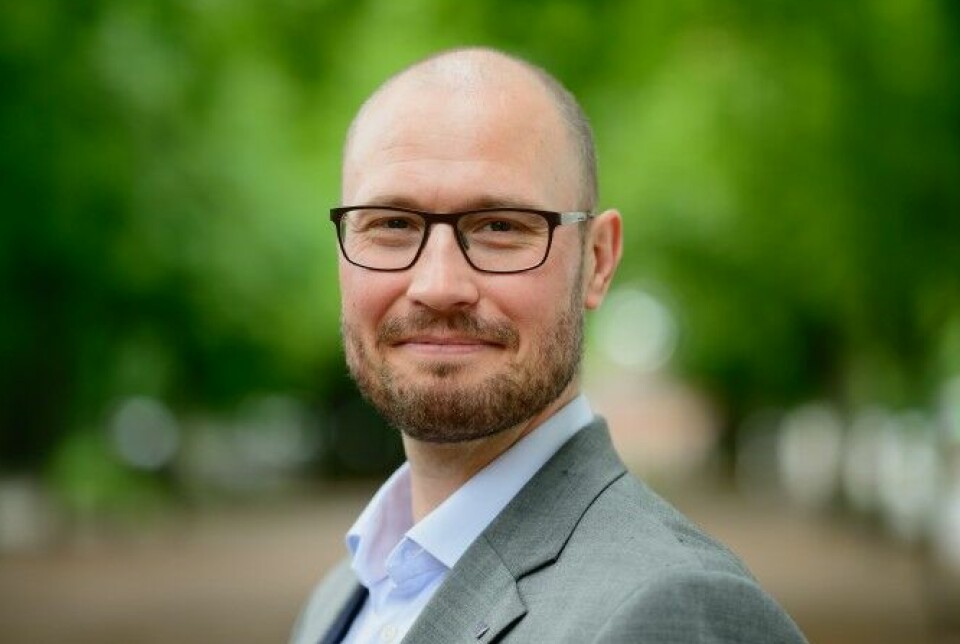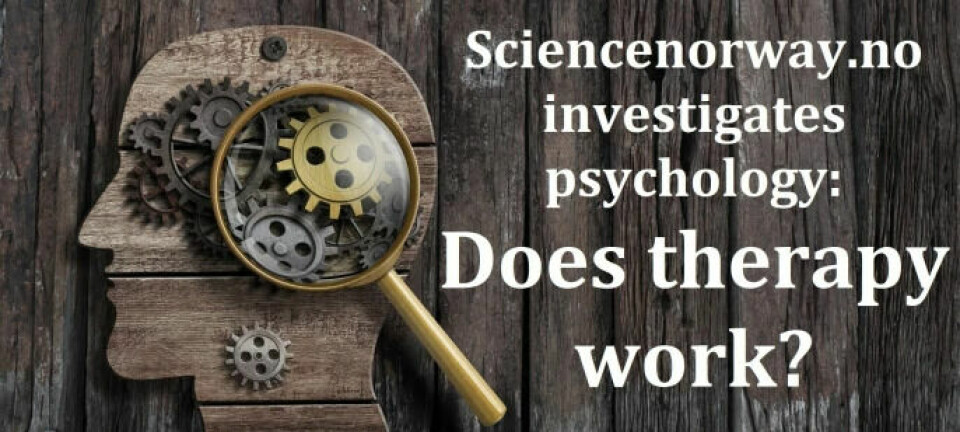
Norwegian Psychological Association to lawmakers: Patient experience is crucial in therapy outcomes
Several researchers are asking critical questions about the research that the field of psychology is based on. The Norwegian Psychological Association wants the authorities to tackle one issue in particular.
In a series of articles, sciencenorway.no has interviewed researchers about the field of psychology. Håkon Kongsrud Skard, president of the Norwegian Psychological Association, has read the articles.
He thinks sciencenorway.no has highlighted important debates from the field he represents and welcomes this opportunity.
The series of articles reveals that researchers harbour considerable disagreement about how well psychotherapy works.
How effective is psychotherapy?
Joar Øveraas Halvorsen counts himself among those who believe that psychotherapy’s effectiveness is less than what is often claimed. Research shows that only one in seven patients who undergo therapy improve significantly from treatment, Halvorsen told sciencenorway.no. He is a clinical psychologist and associate professor at NTNU.
He believes the research shows that psychotherapy has a small to moderate effect. Summaries state that the standardised effect size is between 0.3 and 0.4. An effect size of 0.5 is considered a medium effect, while a figure above 0.8 is considered a large effect.
Ole André Solbakken is a professor of psychology at the University of Oslo and has a different response.
“Throughout the entire history of therapy – across therapists, diagnostic criteria, varied therapeutic approaches, and thousands upon thousands of patients – the effect size averages around 0.8,” he tells sciencenorway.no.
The background for these conflicting opinions is that researchers deeply disagree about what requirements should be placed on psychological research.
Some experts in the field, like Halvorsen, believe that much of the research quality is poor and that the results are artificially inflated.
Treatment is more than conversation
The president of the Norwegian Psychological Association acknowledges that there is professional disagreement about how well psychotherapy works.
But even though the debate about the effectiveness of talk therapy can be interesting, he believes patients are offered a broader range of services in the healthcare system today.
“If you have mental health problems and are referred to mental health care, you’ll be offered interdisciplinary services that consist of more than talk therapy. We use all the tools that we know have a documented effect,” Skard says.
“You might be offered medication if you want it. You can have talk therapy if you prefer. If what you need most is help with finances, or to become more physically active, those are also options. Or all of them in combination, if it makes sense for you. Personalised treatment is an essential part of clinical expertise.”
Hope is important
“I think it’s really important to give people with mental health problems realistic information about what they can expect, so that they can make informed choices,” Halvorsen said in another article in the series.
Skard believes that no one should hesitate to recommend talk therapy if any of their loved ones experience mental health problems.
“If some studies show low estimates of the effectiveness of talk therapy, that’s completely acceptable. It’s comparable to the effect of medications and a lot of treatments you get in somatic medicine,” Skard says.
He believes it is okay to inform patients about research that finds talk therapy to have little effect, but that the most important thing is to give the patients you treat hope.
“Giving patients hope that they will get better is one of the most important factors for healing. This applies to all kinds of treatment, both psychological and somatic,” he says.
At the same time, Skard believes psychologists need to be careful not to push the responsibility onto the patients if they don’t find the treatment is helping them.
Felt guilty
Halvorsen says in one of the articles that he has met several patients who think it is their fault that they are not benefiting from treatment.
Dag Wollebæk had this experience.
The researcher at the Norwegian Institute for Social Research has had longstanding mental health problems and had long believed that psychotherapy would help him with his anxiety. But after trying various forms of treatment for many years and experiencing no improvement, he gave up.
For a long time, Wollebæk thought the problem lay with him, that he had done something wrong or wasn't motivated enough, he says in this article.
“The responsibility lies with you as the patient. The treatment is assumed to be effective. And if it doesn't work, it's ‘your fault’ or you have ‘treatment resistance'," Wollebæk said.
Psychologists need to receive feedback
Skard believes that it is completely wrong for a psychologist to say that a patient is ‘treatment resistant’ or ‘lacks motivation’ if the treatment does not work.
This places the fault with the patient, when it could just as well be the therapist's fault, he argues.
“It could just be that the particular method of treatment doesn’t work for this patient,” he says.
Skard believes that when treatment doesn’t work, psychologists are often not skilled enough to correct the course.
He believes psychologists need to get feedback from patients.
And he thinks it’s time for the authorities to take this seriously.
“At the Norwegian Psychological Association we’ve taken this up with the authorities for a long time. We want feedback to be systematically collected from patients undergoing treatment,” Skard says.
Experience doesn’t increase competence
Professionals generally become more competent as they gain more experience.
Studies have shown that this is actually not the case with psychologists.
Paradoxically, therapists do not get better and better the more experience they gain. They get worse and worse as their career progresses.
That's what Henrik Berg, a professor of the theory of science at the University of Bergen, said in one of the interviews.
Svein Magnussen, a professor of psychology at the University of Oslo, proposes an explanation for this paradox.
What makes you better with experience is feedback.
“Many professions in which psychologists use their expertise have no tradition of systematic feedback,” he says.
A system needs to be put in place
Skard calls for the use of tools where the patient can share their experience with the therapist and the treatment.
Are they experiencing any symptom relief? Improved quality of life? Greater degree of coping with life?
“Some places are already doing this, like Lovisenberg Hospital and Modum Bad. But it should be done systematically throughout the healthcare services,” Skard says.
An expert committee that submitted a report in September of this year has proposed the same thing.
“All units in mental health care should routinely collect information on the patient's experiences with and perceived benefit of the treatment," they write in their report (link in Norwegian).
Most viewed
Should psychotherapy be more regulated?
Jørgen Flor is
a clinical psychologist. In
one of the articles, he points out that as a therapist you can "sit in
a secluded office and do a lot of strange things that no one has access to".
“That’s part of the problem in our profession,” he says.
Joar Øveraas Halvorsen also points out that there is very little regulation of the approximately 500 different methods that exist within psychotherapy.
“I can sit in my psychologist's office and offer any treatment, with or without evidence from research,” he says.
The authorities don’t tell psychologists which treatment has produced the best effect or which therapies are considered knowledge-based and which do not have enough documentation to be used.
Halvorsen finds it strange that psychotherapy is not regulated more.
Too early
Skard, on the other hand, does not believe in such regulation.
“In an ideal world, we could perhaps talk about it. But I don't think such an approach suits the mental and relational phenomena we work with,” he says.
It is a challenge for therapists that we do not currently know which patients should be offered one or the other of the various psychological treatment methods.
“Instead, I believe we should ensure that the various treatment centres have several methods available, so that patients can actually try another method if they don't experience improvement,” he says.
Unfortunately, this is not necessarily the case today, Skard believes.
Must listen to the patient more
Skard notes that all members of the Norwegian Psychological Association have committed to following evidence-based practices. The association’s statement of principles has three equally important points:
- First, the treatment must be based on knowledge. This means that it must be based on the best available research.
- Second, the therapists must use their clinical experience and expertise.
- Third, they must emphasise the patient's own preferences.
Skard believes that psychologists should put more weight on this last point.
“If a patient comes in and wants us to work with emotions, we shouldn’t choose a treatment that relies heavily on thoughts and behaviour. The reverse applies as well. In either case, the treatment probably wouldn’t be very successful,” he says.
Method should not control treatment
Research shows that in many cases there is no basis for dividing patients into groups and saying that this method works best for one and another works better for others.
Many different theories have been proposed for why mental health problems occur, but researchers have not been able to determine which of them – if any – are correct.
They also do not know how the methods based on these theories affect the mechanisms that cause mental illness.
Therefore, psychological methods must not become too directive, Skard believes.
Methods can be useful, however.
“Not because they are metacognitive or cognitive, but because they create a framework for treatment,” Skard says. “Research shows that structured treatment is better than unstructured treatment. The therapists who work according to a model achieve better results than those who work with non-specific treatments."
———
Translated by Ingrid P. Nuse
Read the Norwegian version of this article at forskning.no






































